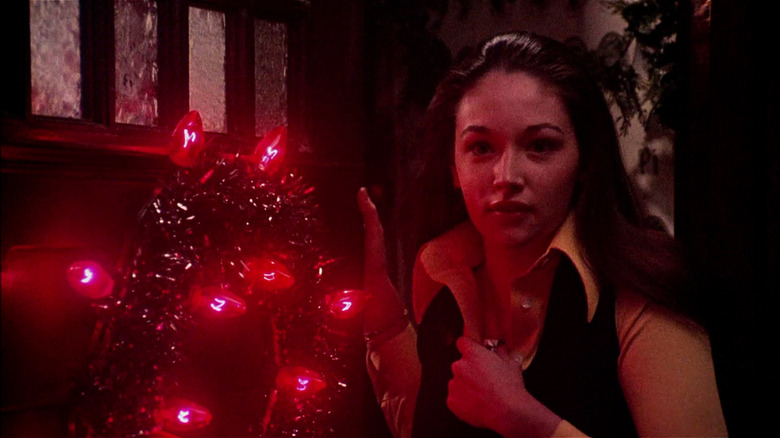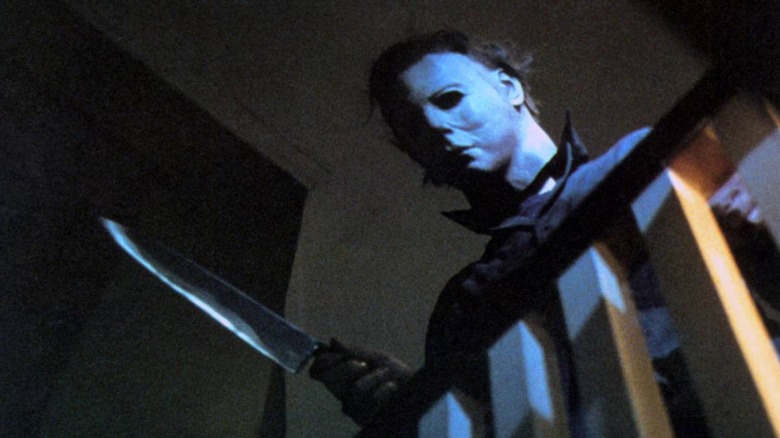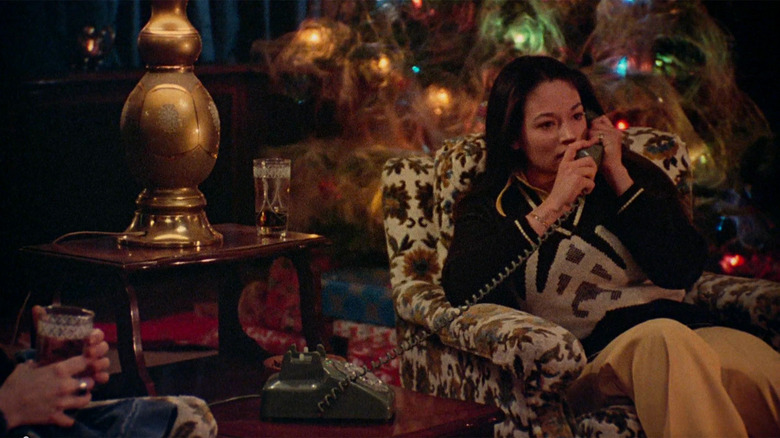How Halloween Became The Unofficial Sequel To Black Christmas
You might think of "Halloween" as the patriarch of the slasher film sub-genre, but John Carpenter's iconic horror movie has a formidable older sister. Before Michael Meyers was stalking the streets of Haddonfield, there was a psycho prowling a college campus, killing off sorority sisters one by one. "Black Christmas" might not always get its due as one of the first slashers, but its influence can be felt everywhere because it informed one of the most important horror films ever made. Without "Black Christmas," we wouldn't be able to celebrate "Halloween." So pour yourself some spiked egg-nog and throw on your favorite holiday sweater, things are about to get chilly.
Released in 1974 and directed by Bob Clark (who also defined the Christmas season when he directed "A Christmas Story" — this man definitely has a lot of Christmas energy), "Black Christmas" tells what we now think of a as typical slasher tale. There are some conventionally attractive young people and a mysterious psycho with plenty of means and opportunity, but no discernible motive besides fear and chaos. On top of that, "Black Christmas" pumps up the holiday atmosphere, which offers some delicious juxtaposition when paired with its sense of foreboding death. And you could say the exact same thing about Carpenter's "Halloween" which debuted in theaters a few years later in 1978. Conventionally attractive young people? Check. Mysterious psycho? Check. A holiday atmosphere that should exude innocence but really makes you feel even more on edge? Check.
It's Beginning to Look A Lot Like Halloween
And yet, "Black Christmas" doesn't have the same staying power as "Halloween," and it certainly doesn't have as many movies dedicated to its leading monster, the blandly named Billy. Two remakes have hit theaters in the 45 plus years since the first film was released, one in 2006 and another in 2019, but none have inspired the devotion that Michael Myers and Laurie Strode command. There are certainly a lot of factors at play, but it's hard not to wonder if things would be different if Clark popped out a "Black Christmas" sequel shortly after the release of the first movie, the same way Carpenter did when he released "Halloween II" in 1981.
According to an interview with Icons of Fright, Clark was considering it, and he even shared some of his ideas with Carpenter while they were working on a never-to-be-released film together:
I never intended to do a sequel [to "Black Christmas"]. I did a film about three years later... started a film with John Carpenter. It was his first film for Warner Bros. He asked me if I was ever going to do a sequel and I said no. I was through with horror; I didn't come into the business to do just horror. He said, 'Well what would you do if you did do a sequel?' I said it would be the next year and the guy would have actually been caught, escape from a mental institution, go back to the house, and they would start all over again. And I would call it Halloween.
All I Want for Halloween Is You
Despite the similarities between the plot of "Halloween" and Clark's dream "Black Christmas" sequel, Clark staunchly believes that Carpenter did not copy his work. That may sound farfetched, but it does reflect what we know about the creation of "Halloween." When Carpenter and Debra Hill were working on the script for the first movie, they were calling it "The Babysitter Murders," and the thrust of the film centered on the fact that there was a psycho preying on babysitters, with no holiday theme or sequel connection in sight. It was the producers of "Halloween," Irwin Yablans and Moustapha Akkad, who pitched the name change. And as Clark declared in his interview, there were a lot of scripts called "Halloween" floating around back in those days:
The truth is John didn't copy "Black Christmas". He wrote a script, directed the script, did the casting. "Halloween" is his horror movie and besides, the script came to him already titled anyway. He liked "Black Christmas" and may have been influenced by it, but in no way did John Carpenter copy the idea. Fifteen other people at that time had thought to do a movie called "Halloween", but the script came to John with that title on it.
"Halloween" might not be the "Black Christmas" sequel that Clark or Carpenter intended, but it's hard to deny the connection between the two films. They're both trailblazers, they've both influenced slasher films to do this day and they're both delightful movies to watch around their respective holidays. You can't deny that "Halloween" and "Black Christmas" really embody the darker, more adult side of their holidays perfectly. They're the kind of movies that have transformed into a sort of seasonal ritual, the kind of movies you have to watch every year to really get in the holiday spirit. How lucky are we to have them?


